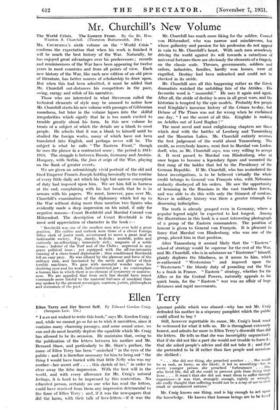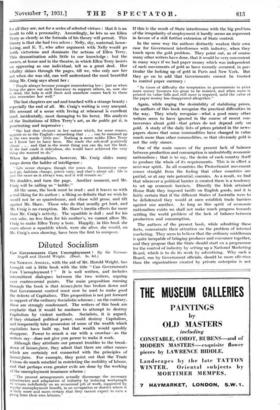Ellen Terry Ellen Terry and Her Secret Self. By Edward
Gordon Craig.
, (Sampson Low. 15s.)
" I HAD not wished to write this book," says Mr. Gordon Craig : and, while we cannot go so far as to wish it unwritten, since it contains many charming passages, and some sound sense, we can and do most heartily deplore the squabble which Mr. Craig has allowed to be its occasion. He maintains that, owing to the publication of the letters between his mother and Mr. Bernard Shaw, and particularly to Mr.. Shaw's preface, the name of Ellen Terry has been " smirched " in the eyes of the public : and it is therefore necessary for him to bring out " the thing I would have buried with that little Nelly who was my mother—her secret self . . . . this sketch of her," in order to clear away the false impression. With the best will in the world, and with every allowance for Mr.. Craig's natural feelings, it is hard to be impressed by this contention. No educated person, certainly no one who has read the letters, could have received from them any impression detrimental to the fame of Ellen Terry : and, if it was the newspapers that did the harm, with their talk of love-letters=iflt- was. the ignorant public which was abused—why has not Mr. Craig defended his mother in a sixpenny pamphlet which the public
could afford to buy ?
Still, however regrettable its cause, Mr. Craig's book must be welcomed for what it tells us. He is throughout extremely honest, and admits far more to Ellen Terry's discredit than did the letters. He tells us that she was incorrigibly unpunctual ; that if she did not like a part would not trouble to learn it ; that she asked people's advice and did not take it ; and that she pretended to be ill rather than face people and occasions she disliked :
. . . She did one thing, she preached another . . . She would be as rash, as hasty, as she liked; it led to something—but to every younger person she preached ' forbearance ' . . . She, who lived life, did all she could to prevent girls from living their lives . . . It wasn't that she did not want them to suffer through experience—it was that, strangely enough, rightly or wrongly• she really thought that suffering would not be a scrap of use to their small or unbalanced natures.'
Mr. Craig knows one thing, and is big enough to act upon the knowledge. He knows that human beings are to be loved for all they are, not for a series of selected virtues : that it is an insult to edit a personality. Accordingly, he lets us see Ellen Terry as clearly as the formula of his theory will permit. This theory is that she had two selves : Nelly, shy, maternal, home- loving, and E. T. who after argument with Nelly would go forth victorious and dominate the actions of Ellen Terry. This dramatization adds little to our knowledge : but the scenes, at home and in the theatre, in which Ellen Terry insists on appearing as one individual, tell us a great deal. Her vitality shines through the pages, till we, who only saw her act when she was old, can well understand the most beautiful thing Mr. Craig says about her :
" People always become younger remembering her : just as when living she gave out such buoyancy to support others, so, now she is dead, the help is still there and somehow comes back to those who remember her well."
The last chapters are sad and touched with a strange beauty : especially the end of all. Mr. Craig's writing is very unequal. His account of a scene with Irving at rehearsal is excellent (and, incidentally, most damaging to his hero). His analysis of the limitations of Ellen Terry's art, as the public got it, is penetrating and impressive :
" She had that element in her nature which, for some reason, appeals so to the English—something that . . . can be summed up in the two words ' little me.' Nothing is more unlike Ellen Terry as I know her to have .been. She made the sob-stuff positively 4.1assie . . . and that is- the worst thing you can do, not the best. I f she had made it ridiculous, she would have achieved the very thing she wanted to do."
When he philosophizes, however, Mr. Craig slides many rungs down the ladder of intelligence :
" Life never changes, though the years do. Inventions come and go, fashions change, prices vary, and that's about all : life is just the same as it always was, and it will remain so."
We shudder, and turn the page. Another moment, and Mr. Craig will be calling us " laddie."
All the same, the book must be read : and it leaves us with a real liking for its author ; a liking so definite that we wish he would not be so quarrelsome, and chase wild geese, and tilt against Mr. Shaw. Those who do that usually get hurt, and Mr. Craig is no exception. Mr. Shaw's inertia effects far more than Mr. Craig's activity. The squabble is dull : and for his own sake, no less than for his mother's, we cannot allow Mr.
Craig to make Ellen Terry a bore. Happily, in this book she soars above a squabble which, were she alive, she would, on Mr. Craig's own showing, have been the first to compose.















































 Previous page
Previous page